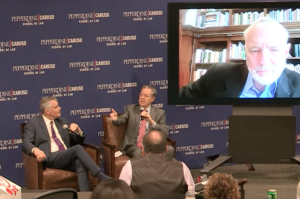Elected officials who differ on most issues broadly agree about the importance of global freedom of religion and belief, two former ambassadors-at-large for international religious freedom asserted.
Sam Brownback and Rabbi David Saperstein discussed bipartisan strategies to advance international religious freedom during an April 8 livestreamed forum originating from Pepperdine University in Malibu, Calif.
“I believe the religious freedom movement is the most important human rights movement right now on the planet,” said Brownback, who appeared in person at the event sponsored by Pepperdine’s Caruso School of Law Sudreau Global Justice Institute and the Pepperdine School of Public Policy.
“The human rights project has been in decline for 15 years. We’ve been losing ground for 15 years. But here is a movement that’s getting more and more of the religious community engaged. … We talk about a common human right—my right to believe as my soul dictates. We believe in religious freedom for everybody everywhere all the time.”
Hindu nationalism in India, conflict between Christians and Muslims in Nigeria, genocide in Myanmar and China’s use of technology to oppress religious dissent illustrate the need for freedom-loving people to “push back against oppressive systems,” he said.
Saperstein, who joined the forum via Zoom, similarly underscored the urgency of protecting freedom of conscience and religious freedom.
He noted significant differences in the United States over competing claims of religious liberty and civil rights domestically—including differences he and Brownback have over religious exemptions regarding LGBTQ rights and abortion.

However, he pointed to remarkable consensus and “strange bedfellow bipartisan coalitions” that have emerged to address international religious freedom—largely because the examples of religious oppression globally are so egregious.
“We are talking about people who are victimized by genocide, who have seen themselves torn from their own lands and ethnically cleansed—who are arrested, convicted, sentenced to death, tortured or serving long prison terms simply because they worship God in a way different from how the controlling powers in any given country see it,” said Saperstein, director emeritus of the Religious Action Center of Reform Judaism.
Sign up for our weekly edition and get all our headlines in your inbox on Thursdays
“The egregiousness of the manifestations of religious persecution, oppression and discrimination that exist across the globe prick the conscience of every person who cares about human rights—who cares about human dignity—whatever their political persuasion.
“So, I think the nature of that repression and the character of that persecution is the single greatest driving force to mobilize people from different partisan backgrounds, different ideological backgrounds and different religious backgrounds to stand together.”
Looking particularly at genocide—the most egregious example of a human rights violation— Brownback noted its religious nature. Historically and currently, religious minorities most often are the targets of genocide, he asserted.
“If you want to protect against genocides, and if you want to say that ‘never again’ means anything, you’ve got to protect religious minorities,” he said.
Shared commitment, different strategies
Tactically, bipartisan cooperation on international religious freedom is possible because it intentionally excludes domestic issues that would “turn it into a punch fest” and divide politicians along partisan lines, Brownback observed.
“It you want to build a tall organization and a broad alliance, you’ve got to keep a narrow focus,” he said.
Saperstein emphasized he views freedom of conscience—of which religious freedom is a key component—as foundational, but he also sees it as inextricably tied to other human rights.
“I don’t think that you can fight for religious freedom narrowly if you exclude fighting for other human rights as well,” he said. “If you don’t have freedom of speech, you can’t have freedom of the pulpit.
“If you don’t have freedom of the press, you can’t have the right to print your holy books, to print your textbooks, to run your radio stations and your television stations and your newspapers and your magazines.
“If you don’t have the fundamental right of association, you do not have the ability to get together in community for celebrations and to worship the way that you want.”
Saperstein agreed other concerns should be tested by whether they advance or divert attention from the cause of enhancing freedom of religion, but he rejected the idea of an exclusive focus.
“For me, it is a broader agenda of religious freedom within human rights that is the secret to success in these efforts. It will help broaden the coalition that is fighting for religious freedom,” he said.
Brownback said he supports a broad human rights agenda, but a decade and a half of trying to advance the broad agenda resulted in “losing ground.”
So, he suggested a more concentrated effort focusing on religious freedom as the “cornerstone” around which other human rights protections can be built.
“If you get this one set right, you can build the others,” he said.
Furthermore, he noted, 80 percent of the global population claims some religious faith, creating the potential for a shared commitment to protecting religious freedom.
Saperstein agreed freedom of conscience—practiced by most as freedom of religion—provides the “bedrock” for other human rights, even though it often has been neglected.
Historically, he noted, passage of the International Religious Freedom Act grew out of a recognition most government human rights initiatives, courts, international organizations and academics gave “short shrift” to religious freedom.
When questioned why religious freedom merited special attention, Saperstein said, “From my liberal standpoint, I said, ‘It’s an affirmative action program.’”
Looking at international trends toward authoritarianism and autocracy, Saperstein again affirmed the importance of affirming religious freedom within a broad context.
“I don’t believe you win the battle for religious freedom without winning the battle against autocracy and for democracy and for human rights across the globe,” he said.
















We seek to connect God’s story and God’s people around the world. To learn more about God’s story, click here.
Send comments and feedback to Eric Black, our editor. For comments to be published, please specify “letter to the editor.” Maximum length for publication is 300 words.